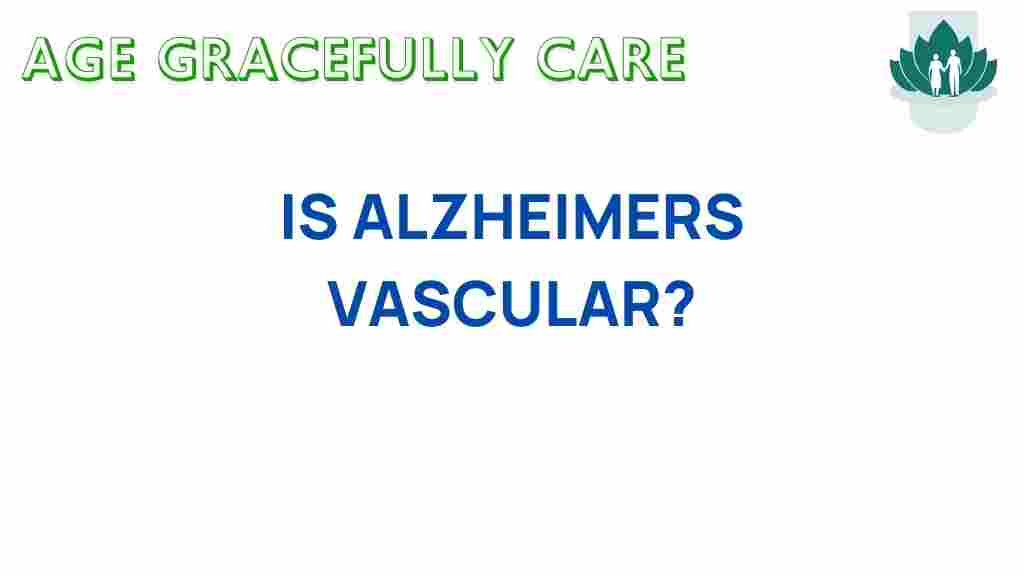Unraveling the Mystery: Is Alzheimer’s Disease Vascular in Nature?
Alzheimer’s disease, a complex and multifaceted condition, remains one of the leading causes of dementia worldwide. As our understanding of this neurodegenerative disorder evolves, researchers are increasingly exploring the relationship between Alzheimer’s and vascular health. This article delves into whether Alzheimer’s disease could be considered vascular in nature, examining the implications for cognitive decline, brain health, and the overall risk factors associated with aging.
Understanding Alzheimer’s Disease
Alzheimer’s is characterized by progressive cognitive decline, impacting memory, reasoning, and daily functioning. It is a type of dementia that involves the accumulation of amyloid plaques and tau tangles in the brain, leading to neurodegeneration. However, emerging evidence suggests that vascular health plays a critical role in the onset and progression of this disease.
The Link Between Alzheimer’s and Vascular Health
The connection between Alzheimer’s and vascular health is supported by several key findings:
- Blood Flow and Brain Health: Proper blood flow is essential for delivering oxygen and nutrients to brain cells. Any impairment in this blood flow can lead to cognitive decline.
- Vascular Contributions to Neurodegeneration: Conditions such as hypertension, diabetes, and high cholesterol can damage blood vessels, potentially accelerating the onset of Alzheimer’s.
- Mixed Dementia: Many individuals with Alzheimer’s also exhibit vascular dementia, suggesting a complex interplay between both conditions.
The Role of Aging in Alzheimer’s Disease and Vascular Health
Aging is the most significant risk factor for developing Alzheimer’s. As we age, our vascular system undergoes changes that can contribute to cognitive decline:
- Decreased Blood Flow: Aging can lead to reduced cerebral blood flow, affecting brain function.
- Vascular Damage: The cumulative effects of lifestyle choices and health conditions can lead to vascular damage over time.
- Inflammation: Aging is often associated with increased inflammation, which can adversely impact vascular health and contribute to neurodegenerative processes.
Step-by-Step Process: Investigating the Vascular Nature of Alzheimer’s
To understand whether Alzheimer’s is vascular in nature, researchers follow a systematic approach:
- Clinical Observations: Identifying patterns in patients with Alzheimer’s and vascular issues.
- Imaging Techniques: Utilizing MRI and PET scans to assess blood flow and identify vascular changes in the brain.
- Biomarker Studies: Analyzing biomarkers related to vascular health and their correlation with Alzheimer’s progression.
- Longitudinal Studies: Tracking cognitive decline in individuals with varying vascular health over time.
Risk Factors for Alzheimer’s and Vascular Health
Understanding the risk factors associated with Alzheimer’s is crucial for prevention and management. Key risk factors include:
- Age: The likelihood of developing Alzheimer’s increases significantly with age.
- Genetics: Family history and specific genetic markers can elevate risk.
- Vascular Conditions: Hypertension, diabetes, and high cholesterol are linked to both vascular health and Alzheimer’s.
- Lifestyle Factors: Smoking, sedentary behavior, and poor diet can negatively impact blood flow and overall brain health.
Troubleshooting Tips: Enhancing Vascular Health to Mitigate Alzheimer’s Risk
Improving vascular health may help reduce the risk of developing Alzheimer’s. Here are some practical tips:
- Regular Exercise: Engage in aerobic activities to promote healthy blood circulation.
- Balanced Diet: Consume a diet rich in fruits, vegetables, whole grains, and healthy fats. The Mediterranean diet is often recommended for brain health.
- Manage Blood Pressure: Regularly monitor and manage blood pressure through lifestyle changes and medication if necessary.
- Stay Mentally Active: Engage in activities that challenge your brain, such as puzzles, reading, or learning new skills.
- Social Engagement: Maintain strong social connections to enhance cognitive resilience.
Current Research and Future Directions
As researchers continue to explore the connection between Alzheimer’s and vascular health, several exciting directions are emerging:
- Targeted Therapies: Developing medications that specifically address vascular issues to potentially slow the progression of Alzheimer’s.
- Preventive Strategies: Identifying individuals at high risk for Alzheimer’s and implementing early interventions focused on improving vascular health.
- Integrated Approaches: Combining treatments for both Alzheimer’s and vascular conditions to improve overall outcomes.
Conclusion: The Importance of Vascular Health in Alzheimer’s Disease
In conclusion, the growing body of evidence suggests a significant link between Alzheimer’s disease and vascular health. As we unravel the complexities of this neurodegenerative disorder, it becomes increasingly clear that maintaining good vascular health is crucial not only for cognitive function but also for overall brain health. By addressing risk factors, improving blood flow, and adopting a healthy lifestyle, individuals may be able to mitigate the effects of aging and reduce their risk of developing Alzheimer’s.
For more information on the latest research in Alzheimer’s and vascular health, visit Alzheimer’s Association for resources and support.
Understanding the intricate relationship between Alzheimer’s and vascular health opens new avenues for prevention and treatment, emphasizing the importance of comprehensive approaches to cognitive decline and dementia.
This article is in the category Health and created by AgeGracefullyCare Team
